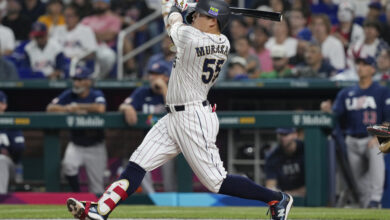
Three Is Cubs’ Magic Number
Where are all my Schoolhouse Rock fans? I might normally be concerned about isolating too small a demographic by citing a show that ended its first run in 1985, but I’m pretty sure CI skews a little older on the whole. Besides, some cultural touchstones transcend generational gaps. I feel like that’s the case for “Three Is a Magic Number,” which remains an iconic bop even if you don’t know where it came from.
Unfortunately for the Cubs, three is a number they’ve reached far too often in August. Or rather, it’s a number they’ve not exceeded often enough. Through 24 August games, they are 3-11 when they score three or fewer runs. However, they are 10-0 when scoring four or more runs. They have scored 15 runs in their losses, an average of just 1.36 runs per game. In the wins? Five runs even.
The end result is an average of 3.33 runs per game in August, dead last in MLB. And that includes their recent 12-run outburst against the Angels in a sweep that also included one of those rare wins in which they scored just three. This lack of scoring has led to 10 one-run games, none of which have seen a score greater than 4-3. The Cubs are 5-5 in those contests, so we’re talking about just six runs or so being the difference between mediocrity and meteoric.
Three is also a magic number because that’s where Seiya Suzuki has been batting for the most part this month, and all season. He’s got a .238 and a 115 wRC+ there overall, but our recent examination of his performance revealed that he’s gotten worse each month. Through 67 August plate appearances in the three-hole, he’s at .212 with a 91 wRC+ and an anemic .058 ISO (100 points below league average) that includes one homer. That’s his only extra-base hit in that spot, by the way.
Those numbers would be acceptable from a Gold Glove-caliber defender batting near the bottom of the order, but Suzuki is a DH batting in the top third. So while he shouldn’t bear all the blame for the Cubs’ lack of offense, having him bat third is crippling their ability to start and maintain rallies. Continuing to embrace this abject lack of power from a position that absolutely must produce at an above-average rate is unconscionable, especially when multiple viable alternatives exist.
Look, I get that the Cubs are 20 games over .500 and boast the fourth-best record in all of MLB, tied with the Phillies and trailing only the Brewers for NL superiority. But that’s like saying someone who appears to be really fit on the outside doesn’t need to worry about their cholesterol, or that not having a familial history of cancer means you don’t need to undergo proactive screenings. Results are all that matter in the end, but I remain very concerned about the process.
While it probably won’t matter in terms of the regular season, what with their 8.5-game lead on the Reds for the final Wild Card spot, pitching doesn’t exactly get weaker in the postseason. So if the Cubs are struggling to plate runners against a cavalcade of meh arms this month, what are they going to do when they face a team’s top three starters? But hey, maybe they’re just rope-a-doping everyone, present company included.

